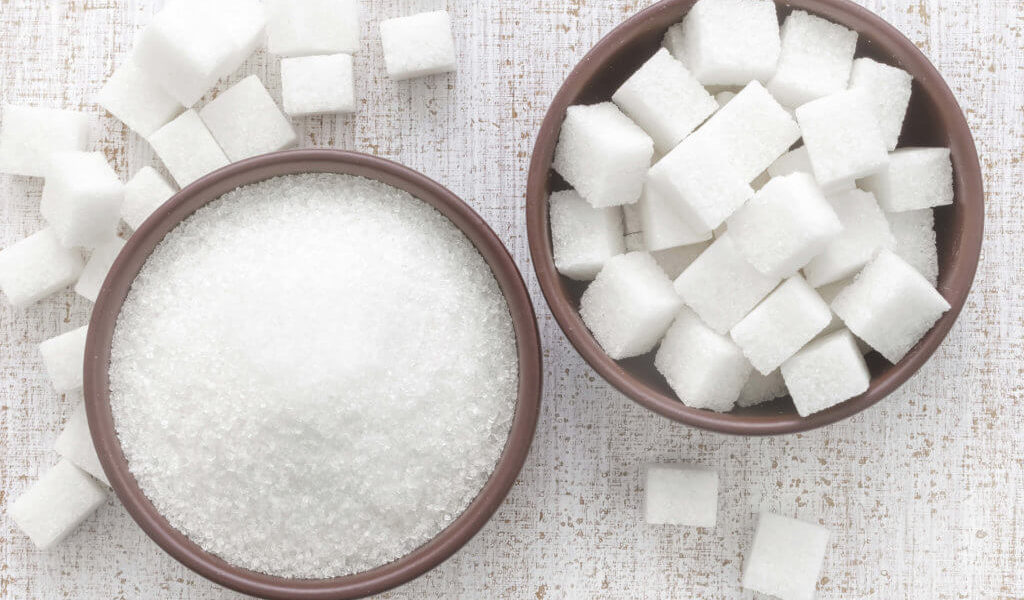◆ Studies indicate that American adults consume as much as 18 teaspoons a day in added sugars.
By Shelley Balls
UW Extension, Nutrition
and Food Safety Educator
• The Scoop on Sugar
Sugar seems to be a hot topic lately and rightfully so due to its potential impact on overall health. The recommended amount of added sugar is to consume no more than 10% of your total calorie intake, which is 200 calories for an adult consuming a 2,000-calorie diet.
This amounts to 50 grams or about 12 teaspoons of sugar per day. This might seem like a lot but data from the 2005-2010 National Health and Nutrition Examination Survey (NHANES) showed that the average American adult consumed 14.9% of their total calorie intake in added sugars, which is approximately 75 grams or 18 teaspoons of sugar each day. So, what happens when we consistently over-consume added sugars? When we over-consume added sugar on a regular basis, we increase our risk of obesity, type 2 diabetes, and heart disease.
• Common Ingredient in the Kitchen
Sugar has been a staple in most kitchens for centuries. Sugar is an important ingredient in baking as it can help keep baked goods fresh longer, help with the fermentation process in breads and improves flavor, color and texture. Sugar is also important in food preservation as it inhibits microbial activity to help prevent jellies and preserves from spoiling. Although there are many uses of sugar in the kitchen, it can add up fast in our diet causing detrimental effects.
• Naturally Occurring Sugars
Sugars have been split into two different categories. The healthier category is your naturally occurring sugars which are found in foods such as fructose in fruits, and lactose in dairy products such as yogurt, cheese and milk. These naturally occurring sugars do not count towards the recommended 10% of total calories from added sugars per day.
Naturally occurring sugars are often accompanied with other nutrients such as protein, calcium, B vitamins, fiber, antioxidants, etc.
• Added Sugars
Added sugars are any sugars that are added during the processing or preparation of food and beverages. Added sugars include both natural sugars such as honey or molasses, and chemically manufactured sugars like high fructose corn syrup. The most common sources of added sugars include sugar sweetened beverages like soft drinks, sports drinks, energy drinks and juice drinks. Cookies, pastries, candy, ice cream and any table sugar you add to your food/beverages at home are also common sources. Added sugars contribute additional calories and zero nutrients, which can promote weight gain.
• Become a Sugar Detective
The new nutrition facts label allows for consumers to be sugar detectives. The new label now lists the amount of added sugars under total sugars which helps us as consumers pick healthier options if desired. For example, if you were looking for a healthy yogurt option, in reading the new label you will be able to tell how many grams of sugar were added, and how many grams are naturally occurring from the lactose. This is also helpful for examining jams, cereals and other dairy products. When reading the ingredients list, look for the following common added sugars:
• Sugar
• Sugar molecules: dextrose, fructose, glucose, lactose, maltose, sucrose
• Malt sugar/syrup
• High-fructose corn syrup
• Anhydrous dextrose
• Honey
• Fruit Juice concentrates
• Corn sweetener
• Brown sugar
• Molasses
• Corn syrup
• Invert sugar
• Raw Sugar
• White granulated sugar
• Confectioner’s powdered sugar
• Maple syrup
• Pancake syrup
• Nectars
• Tips to Reduce Added Sugars:
• Drink more water and unsweetened beverages, try fruit infused waters.
• Read nutrition facts labels to become more aware of foods with added sugars.
• Choose fruit as a naturally sweet dessert.
• Make cookies, donuts, ice cream, etc. “sometimes” foods.
• Choose smaller portions of sweetened beverages or sweets.
• Choose foods with less or no added sugars such as unsweetened applesauce, fruit in 100% juice rather than heavy syrup, plain yogurt, frozen fruit with no added sugar.
Sugar is a common ingredient in many of the foods we consume, so it’s easy to over-consume and not even notice it! Try choosing naturally occurring sugar foods such as fresh pineapple, fresh berries, or a glass of milk to help satisfy your sweet tooth occasionally.






